A flower garden can transform any outdoor space into a vibrant, colorful retreat. Whether you’re looking to create a small corner bursting with blooms or an expansive garden filled with a variety of flowers, there are countless ways to make your space unique. From traditional garden beds to creative DIY projects, the possibilities are endless for bringing life and color to your yard.

Choosing the right flowers is just the beginning. The way you arrange them, the types of containers you use, and even the materials for garden pathways can all play a role in creating a beautiful, cohesive garden. For those who love to get creative, DIY projects offer a perfect opportunity to personalize your garden with unique touches. Think about incorporating upcycled materials, crafting your own garden markers, or even building a custom trellis to support climbing plants.
Every garden is a reflection of the gardener’s personality, and with a little creativity, you can turn your outdoor space into a blooming paradise. Whether you’re working with a small balcony or a large backyard, there’s always room for a flower garden that suits your style. Let your imagination guide you as you plan your garden, and soon enough, you’ll have a space that’s not just beautiful but also a true expression of your passion for gardening.
1. Prioritize Soil Health
Start your flower garden by enhancing soil health. Healthy soil is the foundation of a vibrant garden, providing the necessary nutrients for flowers to thrive. Consider incorporating organic matter like compost, which boosts soil fertility and promotes root growth. Testing the soil pH and making necessary adjustments can also significantly improve plant health, leading to more robust and vibrant flowers.
2. Optimize Plant Placement
Strategically place your plants based on their sunlight and water requirements. Grouping flowers with similar needs ensures that each plant gets the appropriate care, reducing the risk of over or under-watering. Additionally, placing taller plants at the back and shorter ones in front creates a layered effect that adds depth and visual interest to the garden.
3. Incorporate Natural Pest Control
Use natural methods to control pests instead of relying on chemicals. Planting companion plants that deter harmful insects can protect your flowers without disrupting the ecosystem. For example, certain herbs and flowers can act as natural repellents, keeping your garden healthy while promoting biodiversity.
DIY Flower Garden Ideas
21. Chandelier Planter from DIY Show Off

20. Hanging Galvanized Tub Flower Garden Idea (source unknown)
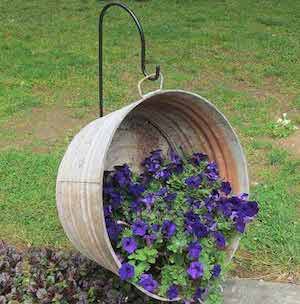
19. Overflowing Wine Barrel Planter from Greyt Paper Crafts
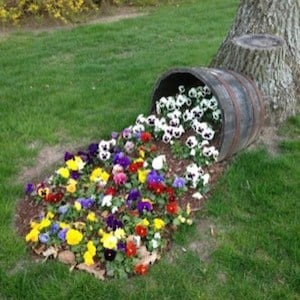
18. Topsy Turvy Terra Cotta Pots from We Heart This

17. Old Tire Planter from Addicted 2 DIY

16. DIY Recycled Barrel Planter from Goods Home Design

15. DIY $8 Front Porch Planter from Home Heart and Hands

14. Upcycled Rainbow Pallet Planter from Hello Creative Family
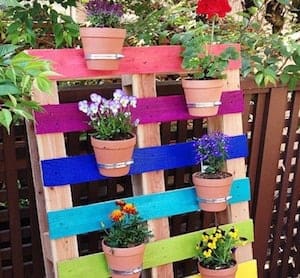
13. Pallet Garden Box from House by Hoff
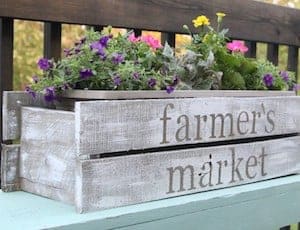
12. Window Garden Box from Paradise Perspectives

11. $20 Cedar Vertical Tiered Ladder Planter from Ana White

10. Crate Display Flower Garden Idea (source unknown)

9. $10 Cedar Tiered Flower Planter from Ana White
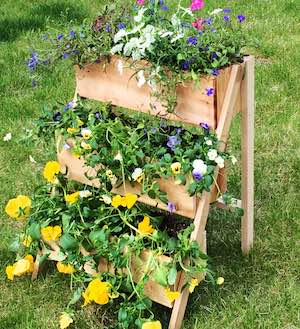
8. Upcycled Wagon Wheel from Urban Gardens NYC

7. $10 DIY Tiered Planter from Anika’s DIY Life
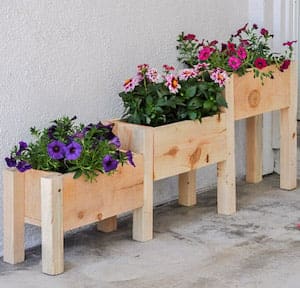
6. Hanging Colander from Sadie Seasongoods

5. $20 Window Garden Box (Video Tutorial) from The Rehab Life
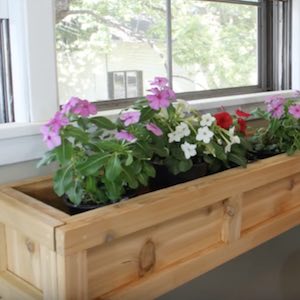
4. Swinging Tire Planter from DIY Showoff

3. Rain Boot Garden from The Chic Site

2. Upcycled Old Drawers from My Repurposed Life

1. House Numbers on Pots from DIY Showoff

What are some low-maintenance flowers that thrive in various climates?
Selecting low-maintenance flowers is crucial for a garden that requires minimal upkeep. Some excellent choices include perennials like Black-Eyed Susans, Coneflowers, and Daylilies, which thrive in a variety of climates and don’t need constant watering or pruning. Opt for native plants to your area for the best results, as they are naturally adapted to your local environment.
How can I design a flower garden with limited space?
Even with limited space, you can create a vibrant flower garden by using vertical gardening techniques, container gardening, or a tiered planting approach. Consider using trellises or wall-mounted planters to add height and depth. Companion planting can also maximize space by pairing plants that grow well together in the same area.
What should I consider when planning the layout of my flower garden?
The layout of your flower garden should take into account the amount of sunlight each area receives, the soil type, and the height of your plants. Start by sketching out a rough plan, placing taller plants at the back or center and shorter ones toward the edges. Ensure paths or spaces are left for easy access for maintenance and enjoyment.
How do I ensure continuous blooming throughout the growing season?
To maintain a garden with flowers in bloom throughout the season, choose a mix of plants with different bloom times. For example, start with early bloomers like Tulips or Daffodils in spring, followed by summer flowers like Roses and Lavender, and end with late-bloomers such as Chrysanthemums or Asters in the fall. This variety keeps your garden lively from spring through fall.












